Mar 8, 2021
We join in celebrating International Women’s Day by sharing reflections from current Precious Blood Volunteers and alumnae. Enjoy!

Precious Blood Volunteers alumna, Lina Guerrero, with Sister Donna at Precious Blood Ministry of Reconciliation in Chicago
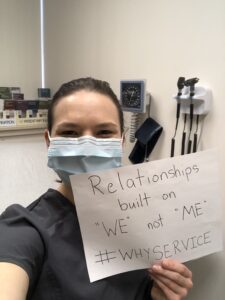
Allison Spraul, a current Precious Blood Volunteer, sharing her reasons for serving
To learn more about serving as a Precious Blood Volunteer go to our website www.preciousbloodvolunteers.org
May 1, 2018
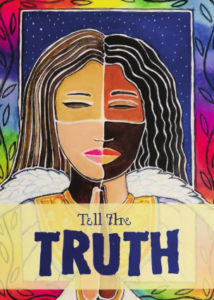 by Leah Landry, Precious Blood Volunteer
by Leah Landry, Precious Blood Volunteer
Most white people do not want to talk about race. In fact, I feel uncomfortable typing this article right now. I am so scared of saying something wrong or implying something hurtful so it would be easier to stay silent. But after Chicago Regional Organizing for Anti-Racism’s training (C-ROAR), I realize it does not matter what I want or what is easy: we have to talk about race.
I knew early on that racism existed. When I was eight years old, my brother’s best friend joined our family. Shaun is African American and I saw that he was treated differently than my Caucasian brothers in our predominately white neighborhood. I remember Shaun and me getting weird looks when we were together and the police pulling him over much more often than my white brothers. But our conversations at home were about how other people were discriminatory, never about how racism worked through us as white people. I knew I had white privilege, but I did not realize I was part of the problem.
As a year-long volunteer at Precious Blood Ministry of Reconciliation (PBMR), all my suspicions that racism ran deeper than I could articulate intensified. I see every day how people are discriminated against because of the color of their skin. In the Juvenile Temporary Detention Center, I was overwhelmed and appalled by the disproportionate number of black and brown teens my city locks up. While working at PBMR, I accompanied a young woman to court and was immediately told I could use the shorter line because the guard mistook me—the only white woman in the crowd—as a lawyer. I met young men who were given tickets for jaywalking and biking on the sidewalk while I had escaped every instance of a police stop with nothing more than a warning. I witnessed intense poverty: people struggling to pay rent, afford clothes, or feed a family, always one crisis away from losing everything. I saw all this and knew that there must be root causes, but I did not understand the depth to which racism and white supremacy created and perpetuated these circumstances.
Through the anti-racism training and researching on my own, I learned that racism is at the heart of every one of these issues. I discovered that nationwide policies of redlining forced black families into segregated neighborhoods and denied them access to the same government-backed loans that allowed my own grandparents to buy a home (“A Case for Reparations”, Ta-Nehesi Coates). I found out how the criminal justice system is designed to target, imprison, and harass people of color (The New Jim Crow, Michelle Alexander). I learned how the inequities originated: not because of something inherent or lacking in communities of color, but because of structures that intentionally privilege white people and subjugate people of color.
The hardest lesson I learned is that racism is not just the overt, stereotypical racism we immediately think of, like the KKK or the rally in Charlottesville. It is the deep-rooted racism of unconscious bias that lies within all of us, because we were all raised in a racist society. This was and still is hard to fully comprehend for me. I, in my ignorant whiteness, perpetuate racism, even though I have a black brother who I love dearly, even though I say I am committed to racial equity and justice, even though my family told me to love everyone regardless of race. I have centuries of ingrained white supremacy born into me. I was raised in a society that was built on the backs of enslaved people of color and live in a country that continues to privilege white people.
The anti-racism weekend was transformational for me. It highlighted how entrenched white supremacy is and now I cannot un-see it. The most challenging part is that now I see racism play out in me. I catch myself stereotyping, preferring white people and white practices, making myself the center in spaces of color, and poking holes in stories of discrimination and racism. One particularly poignant moment of recognizing my own racism was when a person of color in the anti-racism training called me out for my racist behavior during the training itself. It is painful and embarrassing to admit it, but I know it is the truth. I hope that acknowledging my faults can clear the way for other white people to start noticing their own. Nothing is going to change until white people recognize that we are part of the problem, that we are perpetuating the system of white supremacy, whether consciously or unconsciously. But we cannot stop at recognizing that racism works through us, we also must begin to change.
Every time I recognize a way in which I am perpetuating white supremacy, I try to change my behavior and truly stand up for communities of color. I repeatedly question my actions in all my work at PBMR, since I am in a position of power over women of color. I am trying to rework the system so that the young women can be in charge. I am continuously investigating how I, as a white woman, can play a role without recreating unjust structures. I am educating myself on both the oppression and strengths of different communities of color, as I know that each community—and each individual for that matter—has a unique experience of discrimination. I am constantly trying to learn how to be more aware and understanding.
I know talking about race is hard. Believe me, writing this article was really hard, and scary. And we are going to falter and err sometimes. But that’s okay, because mistakes are part of the learning process. The only real mistake is if we do not try at all.
Leah is a current Precious Blood Volunteer serving at Precious Blood Ministry of Reconciliation in Chicago.
To learn more about becoming a Precious Blood Volunteer go to www.preciousbloodvolunteers.org.
Mar 1, 2018

by Leah Landry, current Precious Blood Volunteer
The women of PBMR. Not a phrase you hear often at a Center started by four priests as a safe haven for young men. But over the past few years, the women in the neighborhood have become vital members of the PBMR community. On Saturday, February 3, these women gathered together to christen the new Mother Brunner House – the Women’s Center – with a mural that depicts the strength, serenity, and power of the women of PBMR.
The project included women from three programs at PBMR: the women of the advocacy group Community and Relatives of Illinois’ Incarcerated Children (CRIIC), the women from the Mothers’ Healing Circles who have lost children to incarceration and gun violence, and the Young Women’s Group, the newest program for women.
With the help and direction of PBMR’s teaching artist, Alberto Alaniz, the women gave suggestions of the words and images that come to mind when they think of the women of PBMR. The answers were as varied as the women themselves: unity, strength, love, hearts and stars, peace signs, mother and child. Then representatives from each program consulted with Alberto and together the group came up with the image for the wall. A few weeks later, over 20 women gathered at the Mother Brunner House to paint in the image.
You’d think a room full of 20 women, ranging from ages 6 to 80, painting a huge space with lots of color would be a chaotic scene, but the space had a peaceful, collaborative, and happy feel.
 Mrs. Wingard, the eldest and wisest in the group and a member of CRIIC, shared her reflections on the day: “Just to remember that I put a paintbrush on the wall and Fr. Kelly and Julie and Sr. Donna are gonna walk through there and see the mural and I thought ‘Wow, I really feel a part of that’…And then to think about them getting the house and putting something on the wall that actually reaches out to the community. [The mural] shows families coming together and it’s not just one ethnicity. It’s not just black, not just white, not just latino: it’s everyone coming together for a common cause, for our children, for our community.”
Mrs. Wingard, the eldest and wisest in the group and a member of CRIIC, shared her reflections on the day: “Just to remember that I put a paintbrush on the wall and Fr. Kelly and Julie and Sr. Donna are gonna walk through there and see the mural and I thought ‘Wow, I really feel a part of that’…And then to think about them getting the house and putting something on the wall that actually reaches out to the community. [The mural] shows families coming together and it’s not just one ethnicity. It’s not just black, not just white, not just latino: it’s everyone coming together for a common cause, for our children, for our community.”
Shumeka Taylor, a representative of the Young Women’s Group, said that putting the handprints and quotes on the wall was her favorite part. “The hands was so nice. We all who had been doing the part of the wall and engraving our names and a nice quote and that’s something that’s going to live forever in the house and I like that.” Shumeka added “From the older women to the young women, I truly enjoyed it. The older lady put the French braid in my hair while I painted the rest of the mural because they didn’t want paint to get in my 26 inches. I greatly appreciated everything that went on that day.”
Aldena Brown, a member of the Mothers’ Healing Circles, felt Helen Keller’s quote “Alone we can do so little. Together we can do so much” captured the essence of the day. “That day of the painting felt good. Everyone working together, good laughs, music, and food! That moment was like nothing mattered. Painting that mural was everything, just being a part of something so meaningful. That gave my heart joy and peace in that moment. My mind drifted to a great place pushing that paintbrush. Yes, I must say that will be a day I’ll never forget! I was a part of that painting coming to life! I’m very thankful!”
 The women of PBMR are leaving their legacy all over PBMR and the neighborhood, from the relationships they make to the steps they take towards their goals to the beautiful mural that will greet all the visitors of the Center. From now on, every person who walks through the doors of the Mother Brunner House will know that the women in the community are an integral part of PBMR: strong, unified, and here to stay.
The women of PBMR are leaving their legacy all over PBMR and the neighborhood, from the relationships they make to the steps they take towards their goals to the beautiful mural that will greet all the visitors of the Center. From now on, every person who walks through the doors of the Mother Brunner House will know that the women in the community are an integral part of PBMR: strong, unified, and here to stay.
You can learn more about serving as a Precious Blood Volunteer by going to www.preciousbloodvolunteers.org
You can learn more about our placement at Precious Blood Ministry of Reconciliation by going to https://preciousbloodkc.org/precious-blood-ministry-of-reconciliation/
Nov 17, 2017
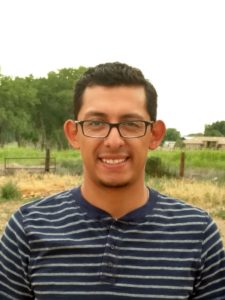
2017-2018 Volunteer Hector Avitia
By Hector Avitia, Precious Blood Volunteer
“Oh man, I can’t wait to see their bubbles burst,” I said with a chuckle as I sipped my chicory coffee. It was a nice April afternoon in the Back of Yards Mexican restaurant La Cecina. Tim Deveney and I were discussing how the culture shock of working with marginalized populations was a “bubble” buster for many volunteers who just graduated college. The bubble symbolizes our world view based on our experiences. A lot of folks who have been fortunate enough to have had most of their needs met and only known about suffering through books and film, have their world view, or bubble, broken open when they meet suffering head on. As someone who had already been in the workforce for seven years and personally experienced poverty, discrimination, and fear of authorities as a child, I believed I was better equipped to handle the problems that the families of south side Chicago were going through. I was going to be the wise old man that guided the other volunteers through the landscape of suffering and sit back with a bag of popcorn as their bubbles burst into a million pieces.
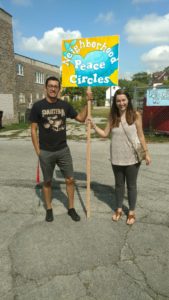
Precious Blood Volunteers Hector and Leah on the International Day of Peace
Precious Blood Ministry of Reconciliation (PBMR) is a place of hope, healing, and radical hospitality. In order to achieve these goals, we must establish strong, meaningful relationships with those we serve. It is a long road filled with tons of bumps and detours because the folks of these communities have been living through ongoing trauma almost all of their lives. Trust is a commodity in this place where even friends and family have turned on each other, sometimes culminating into gun violence. The natural response from the human mind when these things happen is to be cautious of whom to trust. When anyone new comes into their lives, even when their intent is to help, their automatic response is to be careful and put up walls to protect themselves. Because of my background, I believed I had a shortcut to this process of fostering relationships with the young men that I was to be case managing. I think PBMR should have a warning sign outside of the door that reads “This is a place of hope, healing, and radical hospitality… Please leave your ego at the door.”
After only a few weeks into the volunteer experience, I had to come to the harsh reality that my own “tough” upbringing is nothing compared to the struggles of the people to whom we are ministering. One of my firsts tasks at PBMR involved helping a young family get on the road to stability. In order to protect their privacy, I cannot say much more, but I can say that I was completely overwhelmed by the obstacles they were facing. I imagined myself in their situation and what I would do to get ahead. Surely, I could give them great advice by putting myself in their shoes-but immediately I realized how their and my own scenarios were so very different. Even though financial resources were not always there, I always had around me a consistent group of people that loved me and who would do anything for me if I was in trouble. I never had to use their help because I didn’t have an emergency, and I became blind to the treasure that was my network of family and friends.
So, there I am, sitting in a room with a young family that was relying on my help and guidance to avoid homelessness with their young daughter. I was like a deer caught in headlights, stunned and unable to act. And this was supposed to be the “easy” case, something simple that would help ease me into dealing with tougher cases. If I was no good for them now, how was I supposed to be helpful to the rest of the guys I was case managing? How was I going to develop relationships with these young men if my only “Ace up my sleeve” was my not-so-harsh upbringing? I was too concerned with other people’s bubbles to see that my own bubble didn’t stand a chance.
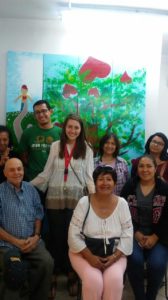
Hector and Leah with a Peace Circle Group
While things seemed dark in this extremely young journey of service, God’s grace found a way to shine through. Fr. David Kelly gave a lecture to a group of students and faculty at the University of Notre Dame. In his talk he mentioned how, despite his many years of leading PBMR and being involved in the lives of those he serves, he has only stories to share. They are stories, because he was not the one going through the suffering. He recognizes that he can be empathetic, but there is no real way to completely suffer the same pain as those he serves. It became clear that having a similar past to those we help is not a qualification to build a positive and long-lasting relationship with them. What matters is to recognize this limitation and to still be willing to give your time and effort to help those in need. I like to think that when we encounter new people with different perspectives, then it is up to us to decide if these experiences burst our bubble, or if they help us grow that world view to encompass more people.
Hector is a current Precious Blood Volunteer serving at Precious Blood Ministry of Reconciliation in Chicago.
To learn more about becoming a Precious Blood Volunteer go to www.preciousbloodvolunteers.org.
Jul 27, 2017
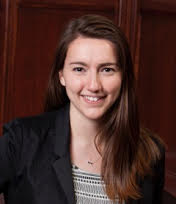
2017-2018 Volunteer Leah Landry
Leah Landry is a native of Glen Ellyn, Illinois, a western suburb of Chicago. She will be moving east into the Back of the Yards neighborhood serving at Precious Blood Ministry Reconciliation. She will be living in community with the Dayton Precious Blood sisters who live and serve in Chicago. This past May she graduated from the University of Notre Dame with a Bachelor of Arts in political science, Spanish and peace studies. Leah was awarded the Yarrow Award from the Kroc Institute at Notre Dame. The Yarrow Award is awarded to peace studies undergraduates who demonstrate academic excellence and a commitment to service in peace and justice.
- Why do you want to volunteer?
“I am excited to be a volunteer at Precious Blood Ministry of Reconciliation because I see this as the start of my vocation dedicated to helping create a restorative justice system in the US. As a volunteer, I will have a chance to learn from and be a part of the stories and the experiences of the young people at PBMR. I hope this year helps me grow and become a better advocate and ally for people who have been hurt by our current justice system.”
- Why do you want to be a Precious Blood Volunteer?
“I want to be a Precious Blood Volunteer because I am looking forward to being a part of a community that is dedicated to making the world a better place and helping others. I think it will be a great experience to work alongside volunteers who are passionate and excited about social justice issues like me.”
- What are you looking forward to about your volunteer experience?
“I am really looking forward to getting to know the Back of the Yards community. I’ve lived outside Chicago my whole life and have always wanted an opportunity to become more ingrained in the city neighborhoods. I am also excited to learn more about restorative justice and be trained in how to facilitate circle processes. I can’t wait to start volunteering at PBMR and finally put into practice all the theories and ideas I learned in my Peace Studies classes.”



 by
by 





